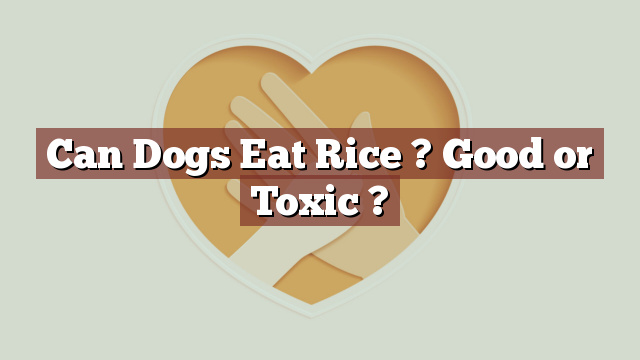Can Dogs Eat Rice? Good or Toxic?
When it comes to our furry friends, it is crucial to know what foods are safe for them to consume. As responsible pet owners, we must ensure that our dogs’ diets provide all the necessary nutrients without posing any potential health risks. Rice, a staple food for many humans, is often a question mark when it comes to feeding it to dogs. In this article, we will explore whether dogs can safely eat rice, the potential health benefits it may offer, and any associated risks.
Nutritional Value of Rice for Dogs: Essential Vitamins and Minerals
Rice, particularly brown rice, can be a valuable addition to a dog’s diet due to its nutritional content. It is a great source of carbohydrates, which provide energy for our canine companions. Additionally, rice contains essential vitamins and minerals, such as B vitamins, iron, and magnesium, all of which contribute to a healthy diet for dogs. These nutrients play a crucial role in their overall well-being, supporting their immune system, metabolism, and more.
Is Rice Safe for Dogs? Potential Health Benefits and Toxicity Risks
Yes, dogs can eat rice in moderation, and it is generally safe for them. In fact, many commercial dog foods include rice as an ingredient. However, it is essential to prepare rice properly before feeding it to your dog. Plain, cooked rice without any seasonings or additives is the safest option. Avoid using butter, oils, or spices, as these can be harmful to dogs.
Rice can provide several health benefits for dogs. It is easily digestible, making it a suitable option for dogs with sensitive stomachs or those recovering from illness or surgery. It can also help alleviate digestive issues such as diarrhea. Additionally, rice can serve as a filler in homemade dog meals, providing a cost-effective way to stretch ingredients while still offering some nutritional value.
However, there are a few risks associated with feeding rice to dogs. Overfeeding rice or feeding it exclusively as a primary source of nutrition can lead to nutrient deficiencies. It is important to remember that dogs are primarily carnivores, and while rice can be a part of their diet, it should not replace essential animal proteins. Additionally, feeding rice in excessive amounts can cause weight gain, which can lead to other health issues such as obesity.
Potential Risks and Benefits of Feeding Rice to Dogs
Feeding rice to dogs in moderation can have several benefits. As mentioned earlier, it is easily digestible and can help soothe an upset stomach. The fiber content in rice can also aid in regulating bowel movements. Furthermore, introducing rice into a dog’s diet can be a helpful way to diversify their meals and add variety.
However, it is crucial to be aware of the potential risks associated with feeding rice to dogs. Some dogs may be allergic or sensitive to grains, including rice. If you notice any adverse reactions such as vomiting, diarrhea, or skin irritations after feeding rice to your dog, it is best to consult a veterinarian. They can provide guidance and recommend alternative dietary options if necessary.
What to Do If Your Dog Eats Rice: Tips for Monitoring and Treatment
If your dog accidentally consumes rice in excessive amounts or shows any signs of discomfort after eating rice, it is important to monitor their condition closely. If you suspect that your dog has consumed toxic rice, consult a veterinarian immediately. They will be able to assess the situation and provide appropriate treatment if necessary.
Conclusion: Moderation and Proper Preparations Make Rice a Safe Addition to a Dog’s Diet
In conclusion, dogs can eat rice in moderation, and it can be a safe and beneficial addition to their diet. Rice provides essential nutrients, is easily digestible, and can help alleviate digestive issues. However, it is crucial to prepare rice properly and feed it in appropriate portions. Remember that while rice can be a part of a dog’s diet, it should not replace essential animal proteins. As always, consulting a veterinarian is advisable to ensure your dog’s specific dietary needs are met and to address any concerns or questions you may have regarding their overall well-being.
Thank you for investing your time in exploring [page_title] on Can-Eat.org. Our goal is to provide readers like you with thorough and reliable information about various dietary topics. Each article, including [page_title], stems from diligent research and a passion for understanding the nuances of our food choices. We believe that knowledge is a vital step towards making informed and healthy decisions. However, while "[page_title]" sheds light on its specific topic, it's crucial to remember that everyone's body reacts differently to foods and dietary changes. What might be beneficial for one person could have different effects on another. Before you consider integrating suggestions or insights from "[page_title]" into your diet, it's always wise to consult with a nutritionist or healthcare professional. Their specialized knowledge ensures that you're making choices best suited to your individual health needs. As you navigate [page_title], be mindful of potential allergies, intolerances, or unique dietary requirements you may have. No singular article can capture the vast diversity of human health, and individualized guidance is invaluable. The content provided in [page_title] serves as a general guide. It is not, by any means, a substitute for personalized medical or nutritional advice. Your health should always be the top priority, and professional guidance is the best path forward. In your journey towards a balanced and nutritious lifestyle, we hope that [page_title] serves as a helpful stepping stone. Remember, informed decisions lead to healthier outcomes. Thank you for trusting Can-Eat.org. Continue exploring, learning, and prioritizing your health. Cheers to a well-informed and healthier future!

